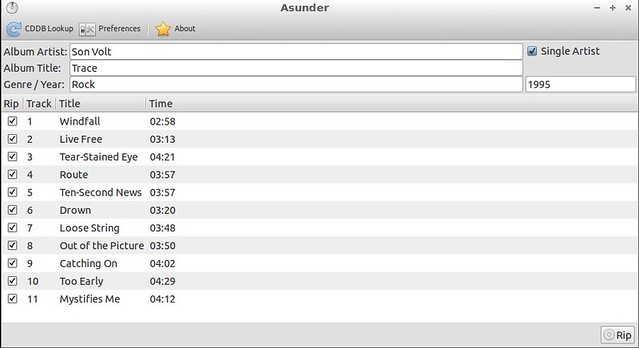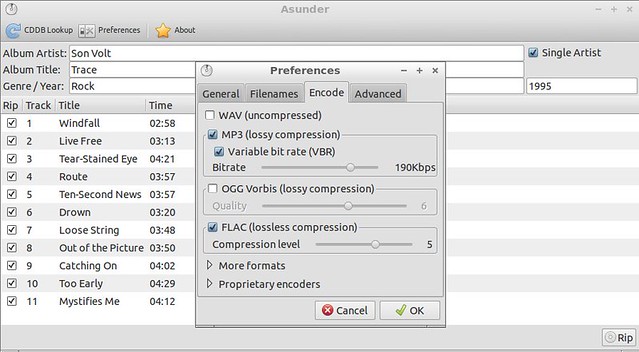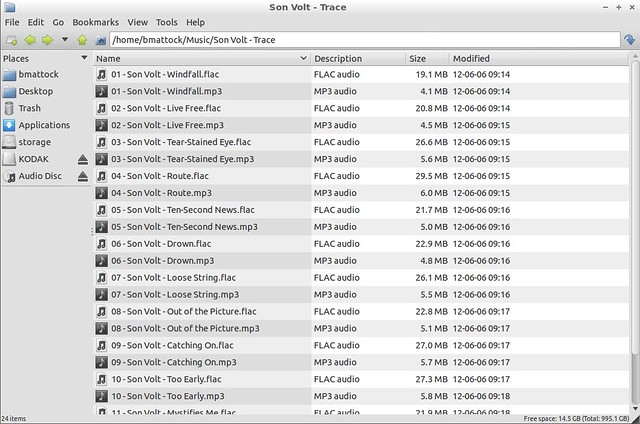goldwax
dozy ming-mong
If you can use Linux, give Vortexbox a try. Ive been using it for a couple of years now without issue. I have some pretty obscure music and it hasnt failed me yet.
I don't know anything about Linux! I'm kind of scared of it!
If you can use Linux, give Vortexbox a try. Ive been using it for a couple of years now without issue. I have some pretty obscure music and it hasnt failed me yet.
I don't know anything about Linux! I'm kind of scared of it!
I don't know anything about Linux! I'm kind of scared of it!

I don't know anything about Linux! I'm kind of scared of it!
It's an operating system like any other, but it does require at least some basic computer knowledge.
However, it's still not for everyone. I get that. I've been working with Linux since 1994 or so, and I think it's great and has come a long way.

Asunder for Linux, 1.5 tb hard drive, linux, and some time. Done. Rips to both FLAC and MP3 at the same time, I move the MP3 files to an external hard drive that plugs into the back of our new Blu-Ray disc player.
I don't see why this kind of thing has to turn into a three-ring circus with all singing, all dancing, hand-wringing whineapalooza. Rip and go. Done. FLAC is lossless. That's it, it doesn't get any better than that.
Why does everything have to be a religious ritual?
Asunder for Linux, 1.5 tb hard drive, linux, and some time. Done. Rips to both FLAC and MP3 at the same time, I move the MP3 files to an external hard drive that plugs into the back of our new Blu-Ray disc player.
I don't see why this kind of thing has to turn into a three-ring circus with all singing, all dancing, hand-wringing whineapalooza. Rip and go. Done. FLAC is lossless. That's it, it doesn't get any better than that.
Why does everything have to be a religious ritual?
I tend to agree, but I have dozens of CDs that don't show up in the online databases, so I have to type in the names. I also see errors in the downloaded genre and titles. Lots of my music is classical, and there doesn't seem to be any standard for the metadata.
I also encounter disks that cannot be perfectly ripped. I have to decide whether to use aggressive cleaning or to try to rip them using a non-secure method, and risk having audible defects.
Many of my CDs are used and abused. On those that have deep scratches, I haven't found anything that works, but on those that are scuffed or milky, I've found Soft-Scrub can clean them up, used with microfiber cloths. They are of no use to me if they don't play, and if I can get a perfect rip, I have it "forever."
Some CDs look OK but take a long time to rip. the drive slows down to less than 1x.
I've done almost 600 and have almost as many to go.
Some aren't as savvy as you. Yay for you! The process has not been perfected could you post .pdf file with your step by step instructions so that all may witness your method? Include screen shots,etc..






I'll buy the ease, but it doesn't seem to support secure ripping or accuraterip.
Dependencies
Linux
GTK 2.4 or greater
Libcddb 0.9.5 or greater
Cdparanoia
LAME (optional for MP3 support)
Vorbis-Tools (optional for Ogg Vorbis support)
FLAC (optional for FLAC support)
WavPack (optional for WavPack support)
mpcenc (optional for Musepack support)
neroAacEnc (optional for AAC support)
mac (optional for Monkey's Audio support)
cdparanoia is a bit different than most other CD-DA extration tools. It contains few-to-no extra features ("Too many features spoil the broth") , concentrating only on the ripping process and knowing as much as possible about the hardware performing it. cdparanoia will read correct, rock-solid audio data from inexpensive drives prone to misalignment, frame jitter, and loss of streaming during atomic reads. cdparanoia will also read and repair data from CDs that have been damaged in some way using interpolation and padding sectors with silence or 0 bytes.
cdparanoia is more or less the only secure ripper available for the Linux operating system and works best on drives that have the Accurate Stream feature and do not cache audio data.
I'll buy the ease, but it doesn't seem to support secure ripping or accuraterip.
I went to EAC after having to redo a hundred audiobook CDs that had skips and repeats and other defects scattered throughout. Not lots, but the iTunes ripper produced no log of errors, so there was no way to know which tracks were defective.
It seems kind of useless to rip to flac if you don't know whether or not you are getting a bit perfect copy. After having a bad experience that cost a lot of time, I don't consider accuraterip to be optional.
OK, but what info do you get if a track is bad? I assume it has some feedback.
It seems kind of useless to rip to flac if you don't know whether or not you are getting a bit perfect copy. After having a bad experience that cost a lot of time, I don't consider accuraterip to be optional.
Status indicators
One of the quirks of cdparanoia is that its ripping status is indicated by an emoticon. As per the cdparanoia manual, the following emoticons are used:
Normal operation, low/no jitter
:-| Normal operation, considerable jitter
:-/ Read drift
Unreported loss of streaming in atomic read operation
8-| Finding read problems at same point during re-read; hard to correct
:-0 SCSI/ATAPI transport error
:-( Scratch detected
;-( Gave up trying to perform a correction
8-X Aborted read due to known, uncorrectable error
:^D Finished extracting
It seems kind of odd to refuse to use tools that are not iTunes because iTunes caused you some problems.
